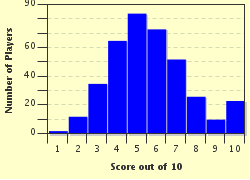Quiz Answer Key and Fun Facts
1. Munchausen syndrome (English spelling), and its by-proxy manifestation, were named after an 18th-century German nobleman named Karl Friedrich Hieronymus, Baron von Münchhausen. What was the baron famous for, which led to the disorder taking his name?
2. Neither Munchausen syndrome nor Munchausen syndrome by proxy appear in the "Diagnostic and Statistical Manual of Mental Disorders" ("DSM-IV-TR"). While "Munchausen syndrome" is the popular name for this disorder, it is actually classified by psychologists under a different name. If you wanted to find Munchausen syndrome in the "DSM-IV-TR", what should you look for instead?
3. Is the following statement true or false? The ailments suffered by the victims of Munchausen syndrome by proxy are always completely fictitious.
4. According to the diagnostic criteria for Munchausen syndrome by proxy (under its other name) in the "DSM-IV-TR", which of the following must be absent from the patient's case history?
5. In an article titled "Web of deceit: A literature review of Munchausen syndrome by proxy" Dr. Donna Rosenberg noted that in 98% of MSbP cases the care-givers ________. Which answer correctly fills the blank?
6. The driving force behind Munchausen syndrome by proxy is the perpetrator's relationship with whom?
7. When a physician suspects that a patient's illness may be the result of Munchausen syndrome by proxy, he or she may attempt a "separation test" to see if the patient's symptoms persist in the absence of the care-giver. True or false?
8. Munchausen syndrome by proxy perpetrators are very good at manipulating members of the medical profession and hiding their involvement with their wards' ailments. In many cases, what is often the first clue that alerts a doctor that she or he may be dealing with a case of MSbP?
9. Munchausen syndrome by proxy was first identified by a British physician named Roy Meadow, and as a result the disorder is sometimes referred to as Meadow's syndrome. In 2005 Professor Sir Roy Meadow was removed from the British Medical Record. Why?
10. Which of the following is NOT a reason why the incidence rate of Munchausen syndrome by proxy is difficult to determine?
Source: Author
LadyCaitriona
This quiz was reviewed by FunTrivia editor
gtho4 before going online.
Any errors found in FunTrivia content are routinely corrected through our feedback system.

